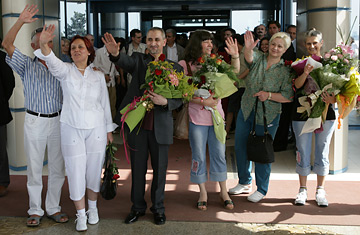
Bulgarian medics freed after being detained in Libya for the past eight years.
Sofia was the scene of great joy and much relief Tuesday, after six Bulgarian medics detained in Libya for the past eight years on murder charges touched down to freedom following a French-brokered agreement for their release. But while attention was largely focused on the arrival of the medical workers and their reunion with families, eyes also turned towards Paris, where French president Nicolas Sarkozy was being credited with the biggest diplomatic coup yet in his already highly accomplished two months in office. Only Sarkozy, it seemed, sought to downplay his own role in the breakthrough to focus on more universal messages.
"This is above all the end of a nightmare for these women and this man, whose innocence and good faith is something everyone in Europe, and I say Europe, believes in," Sarkozy told an Elysée press conference just minutes after his presidential plane delivered the Bulgarians back home. "These women and this man have been held against their will for eight years. It was time it ended."
Tuesday's release of the six medics marked the end of a radical reversal in their fortunes over the past month — and Sarkozy's occasionally controversial diplomatic crusade on their behalf. Less than a month ago, the death penalty handed down with the medics' convictions of having willfully infected 438 children in a Benghazi hospital was upheld by Libya's highest legal body. But intense negotiations among Libyan, French and European Union authorities produced an agreement for the families of the HIV-infected children to receive up to $460 million in damages in exchange for their pardoning of the accused. Libya's legal system soon thereafter commuted the Bulgarians' death sentence to life in prison. Continued dialogue between France and Libya — including direct contacts between Sarkozy and Libya's leader Mohammar Ghaddafi — further paved the way to trade-offs that produced Tuesday's release of the six medics. Additional concessions to Libya included continued medical care of the HIV-infected children who are still alive, financing to modernize the Benghazi hospital, and pledges to being normalizing relations between Libya and the E.U.
Despite the happy ending to the Bulgarians' ordeal, however, there has been criticism of the high-profile way Sarkozy snatched up the E.U.'s previous, discreet efforts to resolve the stand-off. Similar grumbling was heard in France and around Europe over the deployment of Sarkozy's wife, Cécilia, as an emissary to Libya twice in the last ten days of negotiations, as well as her presence on the presidential plane and on the Sofia tarmac with the returning Bulgarians. Critics have claimed the move was an attempt to cast France's First Lady into a quasi-official, freelancing diplomatic role to fit her husband's political objectives. However, Elysée officials note Madame Sarkozy was accompanied with senior officials who handled negotiations, and that if her role was either official or visible in nature, it was as a reminder to the Libyans of how personally involved and concerned Sarkozy himself was in finding a resolution.
"This wasn't some new kind of diplomacy, and it didn't create a new role for the First Lady," Sarkozy scolded a reporter who asked why his wife had played a greater part in the final days of talks than even Foreign Minister Bernard Kouchner had. Instead, he said, both his approach to the crisis, and his wife's involvement marked "a new pragmatism in foreign affairs." Also, when asked to explain exactly why he took up the somewhat remote and curious cause of six Bulgarians, Sarkozy replied with a slightly quirky answer of his own. "They were French because they were unjustly accused, and were suffering," Sarkozy remarked — echoing previous assurances by international experts that the Benghazi infections were the result of unsanitary conditions and lax hospital procedures, rather than criminal intent. "They had to be gotten out of there, and that's what we did."
